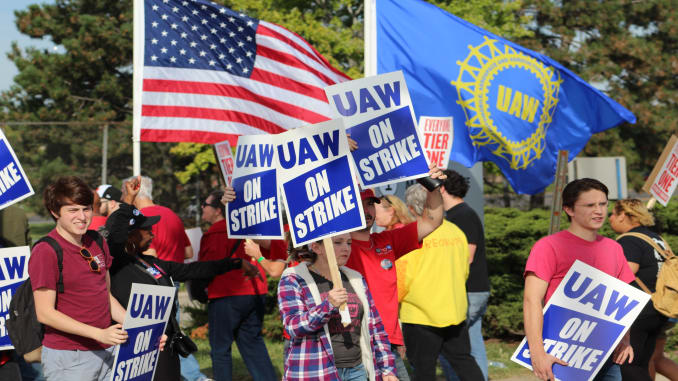Two-Tiered Work Is Exploitation

The GM strike is now in its third week. Strike pay is about to kick in. This is a long, hard struggle. Among the many things that the UAW is fighting for is to end the awful system of two-tiered pay, implemented by the auto companies during the government bailout with a gun to the union’s head. What this does is force new workers to accept lower wages and benefits than already employed workers. That creates divisions among workers and sets a precedent for continued rampant exploitation in the future. Getting rid of this is the UAW’s number one demand here. Rachel Cohen has the story:
Since last week, nearly 50,000 GM workers have been on strike, in part against a two-tiered system enforced by the auto giant that leaves “temporary” workers doing the same jobs as permanent staff for substantially less pay and fewer benefits.
The striking workers, represented by the United Automobile Workers union, or UAW, are demanding a defined path to “permanent seniority” for GM’s temporary workers — who make up about 7 percent of GM’s U.S. workforce. GM has also entrenched inequality in its ranks by contracting out some jobs, like custodial work, that were traditionally staff roles.
“I work right across from a temporary employee who’s been there for two and a half years,” Chaz Akers, a Michigan-based autoworker who has worked at GM for 3 1/2 years told Reuters. “I install the passenger side headlight. He installs the driver side headlight. I make more money than he does. I have better health insurance than he does. It ain’t fair. It ain’t right. If you’re going to pay people to do a job, pay them all the same.”
The workers’ demands are part of a broader push against worker misclassification, a tactic used by employers to lessen their labor costs. The fight has been playing out most aggressively in California, where Democratic Gov. Gavin Newsom signed a sweeping bill last week to transform the lives of workers in his state. The law — known as AB5 — sets strict limits on who can be classified as an independent contractor, rather than an employee, and is the most serious legislative threat to the gig economy in years. The law also provides new momentum for advocates considering similar reforms in other states.
Coming to an agreement on temporary workers has become the most difficult issue in the GM-UAW negotiations, according to the Detroit Free Press. Both sides are reportedly holding strong to their positions. The Free Press also reported that resolving questions around temp workers was union members’ top request when UAW leadership surveyed them last year.
It is in the interest of every worker in the country that this ends. Two-tiered work situations is just one of many forms of employment that now exist to shelter employers from costs, direct employment, or responsibility to workers. It must end nationally. The UAW is taking on this fight for themselves but for all of it. We need to be paying attention to this strike each and every day.


